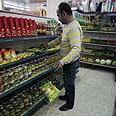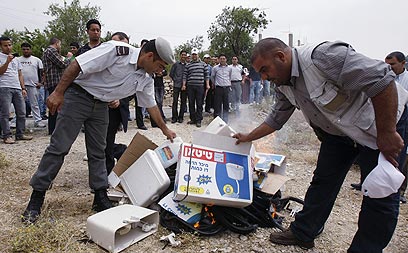
'Palestinians will lose jobs if boycott persists'
Owners of factories in West Bank say South African decision to mark settlement products will only harm local employees. 'Ideology is a nice thing, but economic interests eventually prevail,' says factory manager
The South African Trade and Industry Minister's decision to mark products from the settlements did not surprise factory owners in the West Bank, who are accustomed by now to boycott attempts; however, some of them are concerned that the current move will be followed by other countries, potentially leading to substantial damages for them and for their employees.
Ironically, those who would get harmed the most by the move are some 15,000 Palestinian workers who are employed in these factories and depend on them to make a living.
Related stories:
- Palestinians seek UN condemnation of settlements UK food retailer boycotts settlement exports S. Africa to enforce special labeling of settlement products
"Of course I am worried, but first and foremost I am concerned about my workers, who will be the first to get hit; there are thousands of employees here that are getting conditions that they won't get anywhere else in the Palestinian Authority, and if costs are cut because of the boycott, they will be the first to get fired," said a manager of a factory located in a Jewish settlement in the West Bank.
The manager noted that he successfully handled boycott attempts in the past, but this time the situation is more worrisome: "They always make it difficult for us, and up until now the workers couldn’t care less; ideology is a nice thing, but eventually economic interests prevail. This time we must stop the title wave.

Burning settlement products in West Bank (Photo: AFP)
"The workers and myself are of the same mind that there should be a political agreement at the highest echelons, even if it is secret, that would prevent these boycotts," he added.
According to Yehuda Cohen, a factory owner in the Barkan Industrial Park, which has been boycotted by the Palestinian Authority for nearly two years, "These industrial zones are the most beautiful thing there is – we live and make a living together. This is an example of how you can live peacefully in this area, but the Foreign Ministry doesn’t know how to market it to the outside world."
Cohen, who employs some 40 Palestinian workers, said his employees are very concerned about the situation: "They tell me that they are worried about it, that it’s a mistake and that it will harm them," he said.
Letter issued by South African Trady and Industry minister
Officials at the Samaria Regional Council, which operates the Barkan Industrial Park and employs thousands of Palestinian workers, are also concerned by the financial problems that might ensue.
"It's amazing how the radical Left fails to understand that the main victims are the Palestinians themselves," Samaria Regional Council head Gershon Mesika said.
"Fortunately, so far these boycotts have been nothing but PR maneuvers, and we are sure that Jews and Arabs will continue to work together and strengthen our prosperous industry and live in coexistence," he added.
'South Africa won't be the last'
Meanwhile, the Foreign Ministry on Saturday announced that South Africa's ambassador to Israel will be summoned to the Foreign Ministry on Sunday for clarification.
Ministry officials called the decision "racist," saying "it's a shame that South Africa, which suffered from racism for years, is the one leading this gambit."
The officials added that the decision specifically targets Israel, and has not been issued against any other state, which proves that it is a politically-motivated move that can have detrimental consequences on Israeli exports as a whole.
Former Israeli Ambassador to South Africa Alon Liel told Ynet that "those who thought we could continue stalling the peace process without seeing the boycott campaign expand – were mistaken.
"South Africa and Denmark will not be the last, if the peace process remains at a standstill," Liel warned.
Itamar Fleishman contributed to this article
- Receive Ynetnews updates directly to your desktop











